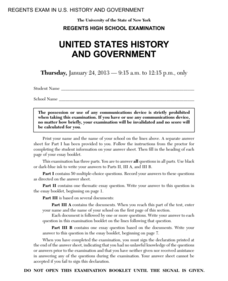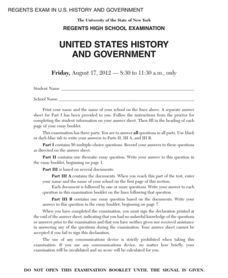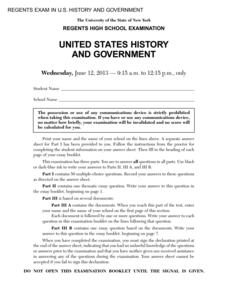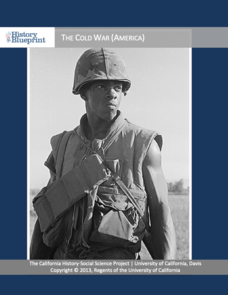New York State Education Department
Global History and Geography Examination: August 2011
The Mongols, Spanish, and Ottomans all rewrote history with their conquest and control of empires. Yet, each made its mark differently. Using a variety of secondary and primary sources, pupils consider the similarities and differences...
New York State Education Department
Global History and Geography Examination: June 2011
People in Ukraine, Rwanda, and Cambodia have all faced challenges to their human rights and even genocide. Using primary and secondary sources, scholars evaluate these challenges and the international community's role in them. The...
New York State Education Department
Global History and Geography Examination: August 2010
Three major faith traditions have shaped world history: Christianity, Islam, and Buddhism. Using secondary sources from textbooks, as well as primary source documents, such as Aztec legends, pupils explore the interplay of these...
New York State Education Department
Global History and Geography Examination: June 2010
Using a set of primary source documents, such as descriptions of climate phenomena and images of weather events, pupils consider how climate shapes history. A second essay prompt and multiple-choice questions with documents engage...
New York State Education Department
US History and Government Examination: August 2011
Using primary source documents, pupils consider how the United States' democratic story has evolved over time. A second essay question examines the role of geography in history, and multiple-choice questions sharpen test-taking skills.
New York State Education Department
US History and Government Examination: June 2010
Just how successful were the reform movements of the ninteenth and twentieth centuries? Using documents ranging from the writings of Mother Jones to the marriage vows of Lucy Stone, individuals consider the question in a scaffolded...
Smithsonian Institution
Latino Patriots
Pupils may not be familiar with Bernardo de Gálvez or Juan Seguín, but these Latinx patriots played important roles in American history. Using biographies of the Revolutionary War hero and Texan politician, historians consider how Latinx...
New York State Education Department
Global History and Geography Examination: January 2010
Agriculture was more revolutionary than some might think. Using a primary source set—including photos of artifacts from Mesopotamia and an amusing comic—learners consider the impacts of the neolithic, agricultural, and green revolutions....
New York State Education Department
US History and Government Examination: January 2011
The presidencies of John F. Kennedy, Richard Nixon, and Ronald Reagan were defined by the Cold War. Using primary source documents and scaffolded analysis questions, pupils explore the effect the Cold War had on these presidencies. A...
New York State Education Department
US History and Government Examination: January 2010
From the trade of the colonial era to the Clean Water Act, water has shaped American history. Class members unpack how water affected the American story using primary sources that span events including the Lewis and Clark expedition to...
New York State Education Department
US History and Government Examination: June 2012
The reform movements—such as abolition, the push for women's suffrage, and the labor movement—shaped modern America. A document analysis activity and essay prompt help learners consider why. Other items in the high-level exam include an...
New York State Education Department
US History and Government Examination: January 2013
While the 1950s seemed to be a time of peace and prosperity, Sputnik, the Korean War, and the Montgomery bus boycott were symptoms of the turmoil that loomed under the surface. Using documents, class members investigate what these events...
New York State Education Department
US History and Government Examination: January 2012
What led to the United States Civil War? Interested historians consider a variety of political, social, and economic factors using primary sources and an essay prompt in an authentic high-stakes test. Primary sources include political...
New York State Education Department
US History and Government Examination: August 2012
Just how far can the American government go during war time? With primary source documents, learners consider the effects on restrictions of freedom of speech, the detention of American citizens of Japanese descent, and the Patriot Act...
New York State Education Department
US History and Government Examination: August 2013
While the United States is now one of the strongest countries in the world, at its founding, it was plagued by controversies over the ratification of the Constitution, the Louisiana Purchase, and the expansion of slavery. Using a...
New York State Education Department
US History and Government Examination: June 2013
How successful has American foreign policy been in the past? Pupils consider the question as part of a state examination in American history. Other prompts include a document analysis and essay of important civil rights cases decided by...
New York State Education Department
US History and Government Examination: August 2014
The Gulf War, the Vietnam War, and the Korean War all featured pivotal moments in United States foreign policy. Individuals consider how these conflicts changed the course of American diplomacy using an essay prompt and documents from a...
New York State Education Department
US History and Government Examination: June 2014
The 1960s marked a pivotal point for social and foreign policy in the United States. Using documents, such as speeches from Martin Luther King Jr. and John F. Kennedy, and authentic test prompts, class members consider the impact of this...
New York State Education Department
US History and Government Examination: January 2014
What led the United States to acquire territory? What were some of the effects of those acquisitions? Learners explore the questions using the 2014 essay from the New York Regents exam. Other items include practice multiple choice...
University of California
The Cold War (America)
The Cold War—with its roots in World War II—impacts the world today. Using an extensive curriculum, scholars consider its impact through primary sources, including speeches and propaganda, as well as other skills-enhancing activities. An...
Library of Congress
The Harlem Renaissance
The Harlem Renaissance brought forth many American art forms including jazz, and the writings of Zora Neale Hurston and Langston Hughes. Using a carefully curated set of documents from the Library of Congress, pupils see the cultural...
Oklahoma City of Museum Art
Harlem Renaissance
Individuals expressed the Harlem Renaissance in diverse forms of art, ranging from poetry to photography to painting. Learners explore pieces using a carefully curated collection from the Oklahoma City Museum of Art. Included lessons ask...
History with Peters
A Clear Signal for Change: Multiple Interpretations and Nat Turner’s Rebellion
Was Nat Turner a hero or a violent criminal? Using primary sources and images that discuss the rebellion of enslaved people he led in antebellum Virginia, scholars consider the question. Then, they create memorials to Turner and...
University of Texas
Understanding Migration
Human migration—often the result of push and pull factors—sometimes has dramatic outcomes for both those leaving their homelands and the host countries. Using a variety of case studies, learners consider those issues. Then, by completing...

























